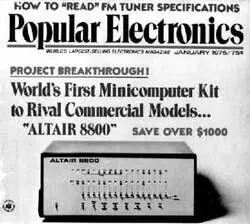5.14. Startups but More So
The classic startup is fast and informal, with few people and little money. Those few people work very hard, and technology magnifies the effect of the decisions they make. If they win, they win big.
In a startup writing web-based applications, everything you associate with startups is taken to an extreme. You can write and launch a product with even fewer people and even less money. You have to be even faster, and you can get away with being more informal. You can literally launch your product as three guys operating out of an apartment, with a server collocated at an ISP. We did.
Over time the teams have gotten smaller, faster, and more informal. In 1960, software development meant a roomful of men with horn-rimmed glasses and narrow black neckties, industriously writing ten lines of code a day on IBM coding forms. In 1980, it was a team of eight to ten people wearing jeans to the office and typing into VT100s. Now it's a couple of guys sitting in a living room with laptops. (And jeans turn out not to be the last word in informality.)
Startups are stressful, and this, unfortunately, is also taken to an extreme with web-based applications. Many software companies, especially at the beginning, have periods where the developers slept under their desks and so on. The alarming thing about web based software is that there is nothing to prevent this becoming the default. The stories about sleeping under desks usually end: then at last we shipped it, and we all went home and slept for a week. Web-based software never ships. You can work 16-hour days for as long as you want to. And because you can, and your competitors can, you tend to be forced to. You can, so you must. It's Parkinson's Law running in reverse.
The worst thing is not the hours but the responsibility. Programmers and system administrators traditionally each have their own separate worries. Programmers worry about bugs, and system administrators worry about infrastructure. Programmers may spend a long day up to their elbows in source code, but at some point they get to go home and forget about it. System administrators never quite leave the job behind, but when they do get paged at 4:00 AM, they don't usually have to do anything very complicated. With webbased applications, these two kinds of stress get combined. The programmers become system administrators, but without the sharply defined limits that ordinarily make the job bearable.
At Viaweb we spent the first six months just writing software. We worked the usual long hours of an early startup. In a desktop software company, this would have been the hard part, but it felt like a vacation compared to the next phase, when we took users onto our server. The second biggest benefit of selling Viaweb to Yahoo (after the money) was to be able to dump ultimate responsibility for the whole thing onto the shoulders of a big company.
Desktop software forces users to become system administrators. Web-based software forces programmers to. There is less stress in total, but more for the programmers. That's not necessarily bad news. If you're a startup competing with a big company, it's good news. Web-based applications offer a straightforward way to outwork your competitors. No startup asks for more.
5.15. Just Good Enough
One thing that might deter you from writing web-based applications is the lameness of web pages as a UI. That is a problem, I admit. There were a few things we would have really liked to add to HTML and HTTP. What matters, though, is that web pages are just good enough.
There is a parallel here with the first microcomputers. The processors in those machines weren't intended to be the CPUs of computers. They were designed to be used in things like traffic lights. But guys like Ed Roberts, who designed the Altair, realized that they were just good enough. You could combine one of these chips with some memory (256 bytes in the first Altair), and front panel switches, and you'd have a working computer. Being able to have your own computer was so exciting that there were plenty of people who wanted to buy them, however limited.
Web pages weren't designed to be a UI for applications, but they're just good enough. And for a significant number of users, software you can use from any browser will be enough of a win in itself to outweigh any awkwardness in the UI. Maybe you can't write the best-looking spreadsheet using HTML, but you can write a spreadsheet that several people can use simultaneously from different locations without special client software, or that can incorporate live data feeds, or that can page you when certain conditions are triggered. More importantly, you can write new kinds of applications that don't even have names yet. VisiCalc was not merely a microcomputer version of a mainframe application, after all—it was a new type of application.
Figure 5-1. Popular Electronics, January 1975 (detail).

Of course, server-based applications don't have to be web based. You could have some other kind of client. But I'm pretty sure that's a bad idea. It would be very convenient if you could assume that everyone would install your client — so convenient that you could easily convince yourself that they all would. But if they don't, you're hosed.
Because web-based software assumes nothing about the client, it will work anywhere the Web works. That's a big advantage already, and the advantage will grow as new web devices proliferate. Users will like you because your software just works, and your life will be easier because you won't have to tweak it for every new client.
I feel like I've watched the evolution of the Web as closely as anyone, and I can't predict what's going to happen with clients. Convergence is probably coming, but where?
How will it all play out? I don't know. And you don't have to know if you bet on web-based applications. No one can break that without breaking browsing. The Web may not be the only way to deliver software, but it's one that works now and will continue to work for a long time. Web-based applications are cheap to develop, and easy for even the smallest startup to deliver. They're a lot of work, and of a particularly stressful kind, but that only makes the odds better for startups.
5.16. Why Not?
E. B. White was amused to learn from a farmer friend that many electrified fences don't have any current running through them. The cows apparently learn to stay away from them, and after that you don't need the current. "Rise up, cows!" he wrote. "Take your liberty while despots snore!"
If you're a hacker who has thought of one day starting a startup, there are probably two things keeping you from doing it. One is that you don't know anything about business. The other is that you're afraid of competition. Neither of these fences have any current in them.
There are only two things you have to know about business: build something users love, and make more than you spend. If you get these two right, you'll be ahead of most startups. You can figure out the rest as you go.
You may not at first make more than you spend, but as long as the gap is closing fast enough you'll be ok. If you start out under funded, it will at least encourage a habit of frugality. The less you spend, the easier it is to make more than you spend. Fortunately, it can be very cheap to launch a web-based application. We launched on under $10,000, and it would be even cheaper today. We had to spend thousands on a server, and thousands more to get SSL. (The only company selling SSL software at the time was Netscape.) Now you can rent a much more powerful server, with SSL included, for less than we paid for bandwidth alone. You could launch a web-based application now for less than the cost of a fancy office chair.
Читать дальше













